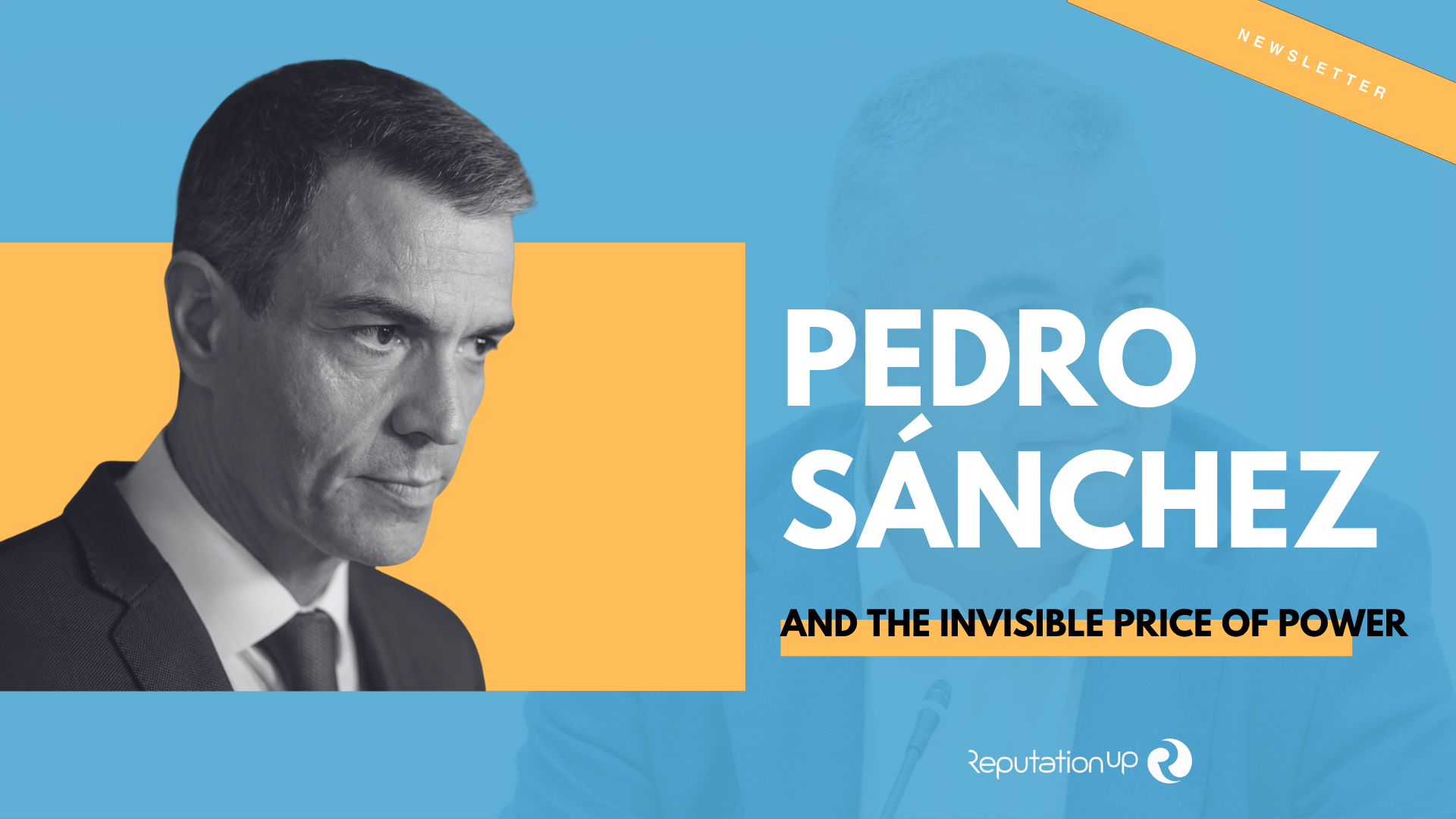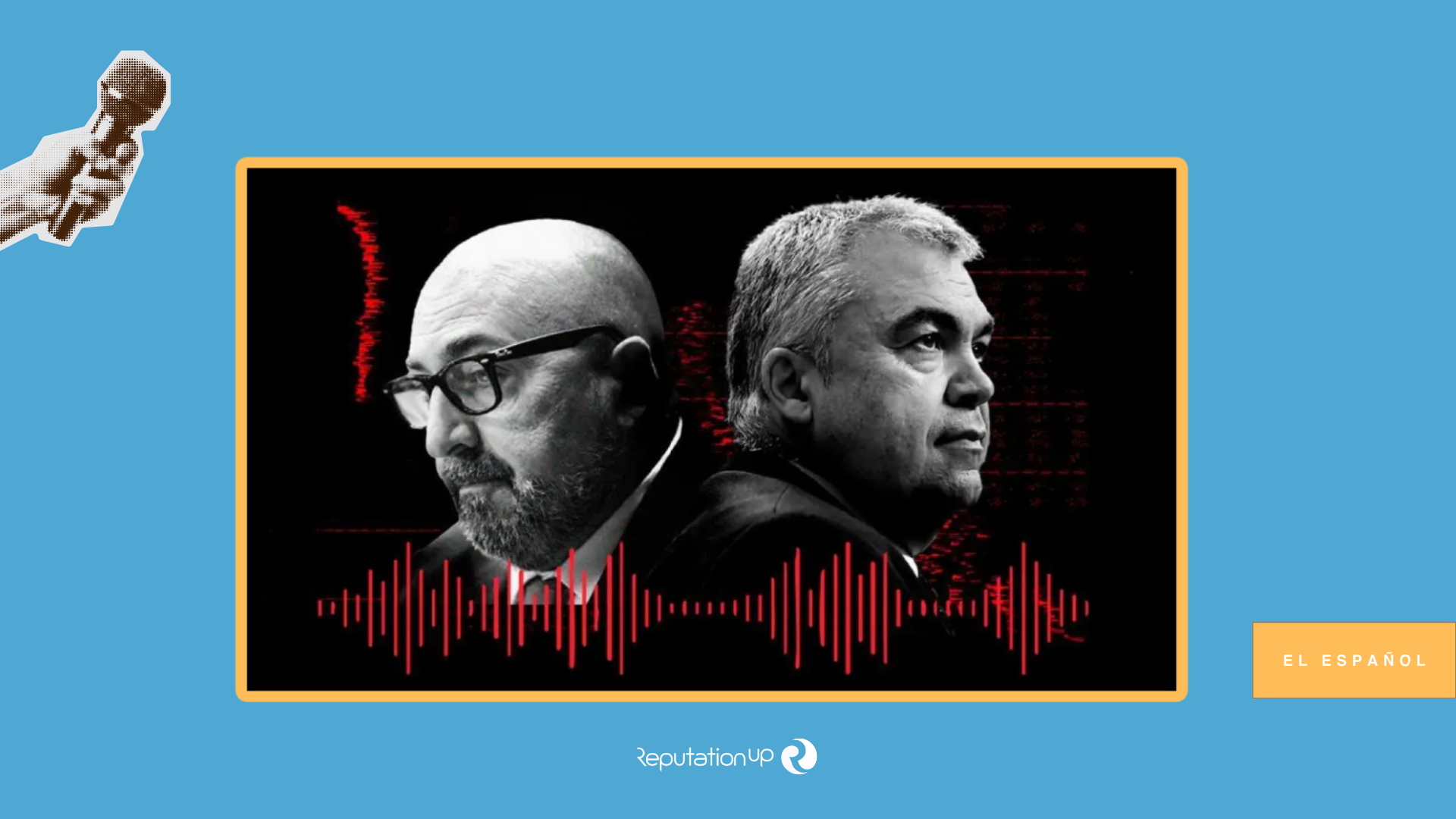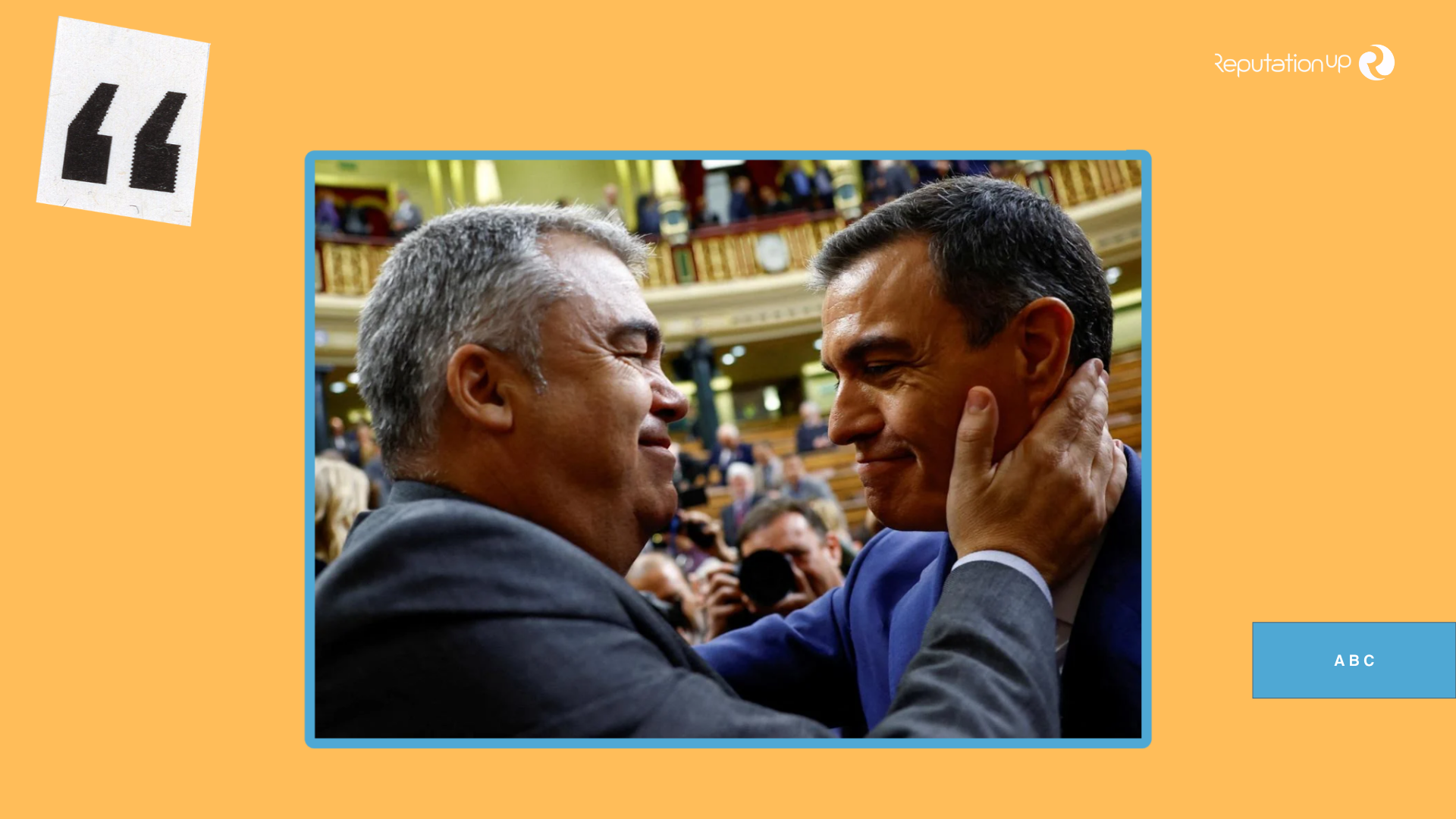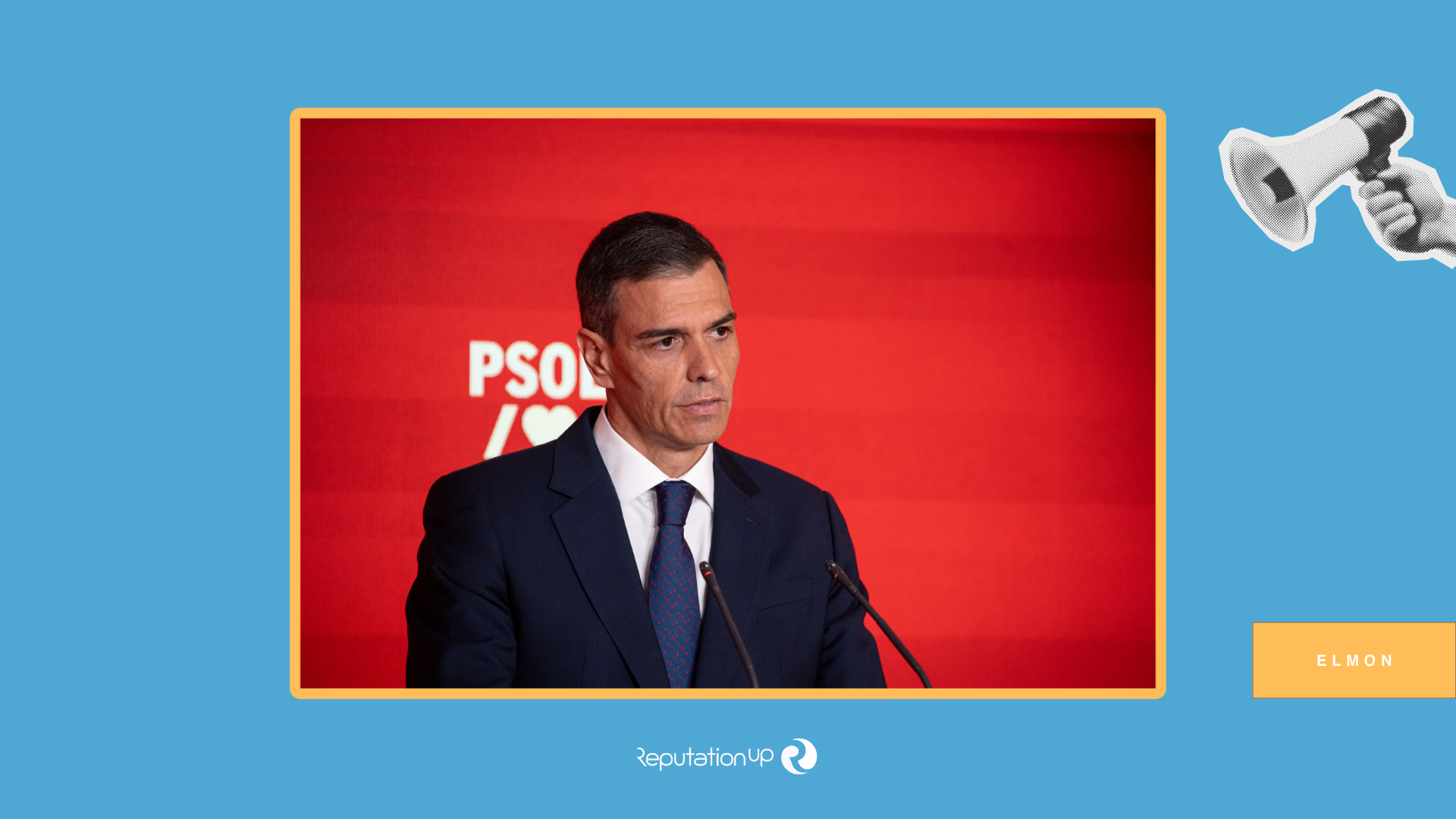For years, Pedro Sánchez has cultivated a reputation for durability. The international press dubbed him “Mr. Teflon.” But even Teflon gives way when the heat is constant and deep.
Today, the figure of the Spanish Prime Minister is facing his greatest test: a corruption scandal that doesn’t directly implicate him, but clearly targets his inner circle.
The Cerdán case —a judicial investigation implicating the former PSOE deputy leader in a network of kickbacks over public works contracts—has gone from being an internal party matter to a state crisis.
How does this scandal affect Pedro Sánchez’s online reputation? To what extent can a leader claim to be unaware of what was happening in his immediate surroundings without eroding his credibility?

The fall of Santos Cerdán: from right-hand man to epicenter of scandal
In politics, loyalties are built over time, destroyed with a single recording.
The report by the Central Operative Unit (UCO), the specialized body of the Civil Guard that assists judges and prosecutors in complex investigations, from political corruption to organized crime and economic crimes, includes 490 pages of transcripts, audio recordings and financial details.
It draws a direct line between Santos Cerdán, until recently the PSOE’s Organization Secretary and the government’s main negotiator with parties such as Junts; José Luis Ábalos, former Minister of Transport; and Koldo García, Ábalos’ former advisor and a key figure in the so-called “Koldo plot.”
The epicenter of the investigation: kickbacks of up to 30% in public contracts, channeled through interposed companies and fictitious invoices.
Among the phrases collected by the UCO, there are some that are almost reputational sentences :
- “Santos Cerdán would have had full knowledge of the payments made and would have acted as a mediator.”
- “Talk to Santos.”
- “That son of a bitch Santos has kept the money, I saw it myself.”
- “Yours is child’s play compared to Santos. There are much more serious things.”
And perhaps the most compromising for the president:
- “Santos does what Pedro tells him to. Period.”
This last line, spoken by Koldo García and reported by El Español, raises a doubt that no press conference can easily erase: was Santos Cerdán simply a loyal operator or was he an extension of presidential power?

Silence: Appearances, Rhetoric, and Reputation Strategy
Pedro Sánchez has attempted to take the helm firmly. In his speech following Cerdán’s departure, he delivered a precise and precise statement:
- “The PSOE is a clean organization.”
- “We will not cover up the corruption that arises within our ranks.”
- “My duty as captain is to take the helm and weather the storm.”
But the audio recordings, the reports, and the public trial didn’t wait for his account. Santos Cerdán’s resignation letter —in which he insists on his innocence and bids a solemn farewell —didn’t prevent papers bearing Sánchez’s face and the word “corrupt” from appearing on the facades of public buildings. In Madrid, Barcelona, Valencia, and many cities across Spain.

In this context, the reputational risk analysis becomes an essential tool for understanding the scope of this crisis. Citizen perception is not only a response to judicial events, but also to the symbolic accumulation of signals that directly affect trust.
Can a president know nothing… and still retain trust?
This is the question dividing public opinion today: Could he not have known? Should everything be known? Is it enough to dismiss those involved?
For many analysts, the problem is no longer legal, but symbolic: when the number two and number three in your party are implicated in corruption cases—and one of them calls you “boss” in conversations where commissions are shared—the question is no longer what you knew, but what your figure represents.
The magnitude of the scandal has crossed borders. Even The Times —one of the most influential newspapers in the United Kingdom—dedicated an editorial to the case, titled: “Time for Pedro Sánchez to rule, or say goodbye,” in which it forcefully states:
“The Spanish people deserve better. Greater accountability. More transparency. A government with principles doesn’t look like this. ”
The same text states that the president “has rejected calls to resign amid a growing corruption crisis” that forced Santos Cerdán to leave office.
The Guardian, for its part, notes that Sánchez is already facing a series of corruption investigations involving his wife, his brother, his former transport minister, and one of the latter’s assistants. All those involved deny the allegations.
The fact that the international press is using nicknames like “Mr. Teflon” to describe a Spanish president or compares him to a greyhound for his ability to dodge crises isn’t just a political anecdote; it’s a symptom of reputational damage.

Junts, PNV and the partners who today demand “guarantees”
But the storm isn’t just pounding inside. The PSOE’s parliamentary allies have already made it clear that confidence is at its limit.
Junts, through Jordi Turull, has directly asked Sánchez for “guarantees” that the investiture agreements will be fulfilled. And they don’t want promises. They want facts. Paperwork. New interlocutors. With names.
“The president has explained to us that he is willing to continue, but he hasn’t specified how,” Turull said upon leaving La Moncloa Palace.
Begoña Gómez, David Sánchez and the “contaminated environment”
While Sánchez tries to contain the fire at Ferraz, other embers are burning nearby. His wife, Begoña Gómez, remains under investigation for alleged influence peddling. His brother, David Sánchez, will go on trial for an irregular appointment. And his attorney general, Álvaro García Ortiz, will be tried for leaking confidential information.
The accumulation of cases, even without a final sentence, reinforces the perception of political marketing at risk.
The PSOE, between internal refoundation and narrative resistance
Cristina Narbona, Borja Cabezón, and Montse Mínguez will jointly assume the positions of PSOE Organization Secretariat until the Federal Committee meeting on July 5. This is an attempt by Sánchez to project an image of restructuring and openness. But is it enough?
Crisis management isn’t just about changing names or promising audits. It requires a narrative reconfiguration that connects with citizens, admits mistakes, and projects a credible future.
A president who resists… but no longer enchants
Pedro Sánchez came to power selling regeneration. Today, many voters are wondering if that promise has become mired in the mud of real politics. Even former allies like El País, usually aligned with the executive branch, published an editorial stating that “the credibility of the government and the president has been shaken.”

Has the contract of trust been broken?
Pedro Sánchez has said his duty is to “take the helm and weather the storm.” But there are storms you can’t weather; you navigate them at the cost of losing crew. Or legitimacy.
Perhaps that’s why The Times declared that “the party is over” for the Spanish prime minister. Because in politics, when the problem isn’t the crime but perception, the punishment isn’t judicial. It’s reputational.
And there, the question that throbs loudest in Ferraz and on the streets of Spain isn’t whether Pedro Sánchez acted with complicity or not. It’s another, quieter but more destructive question:
Do you still believe him?

